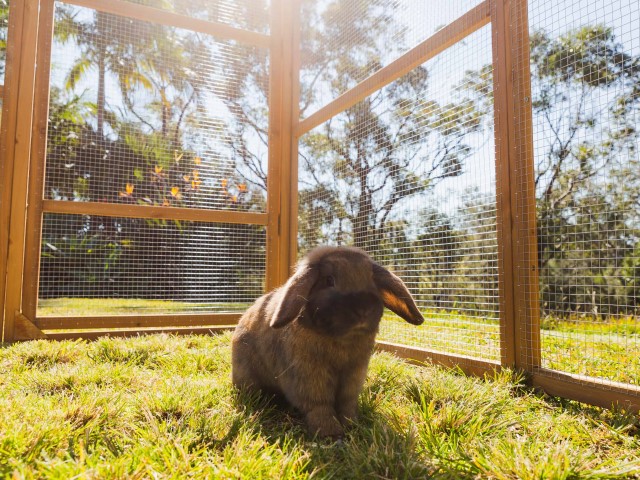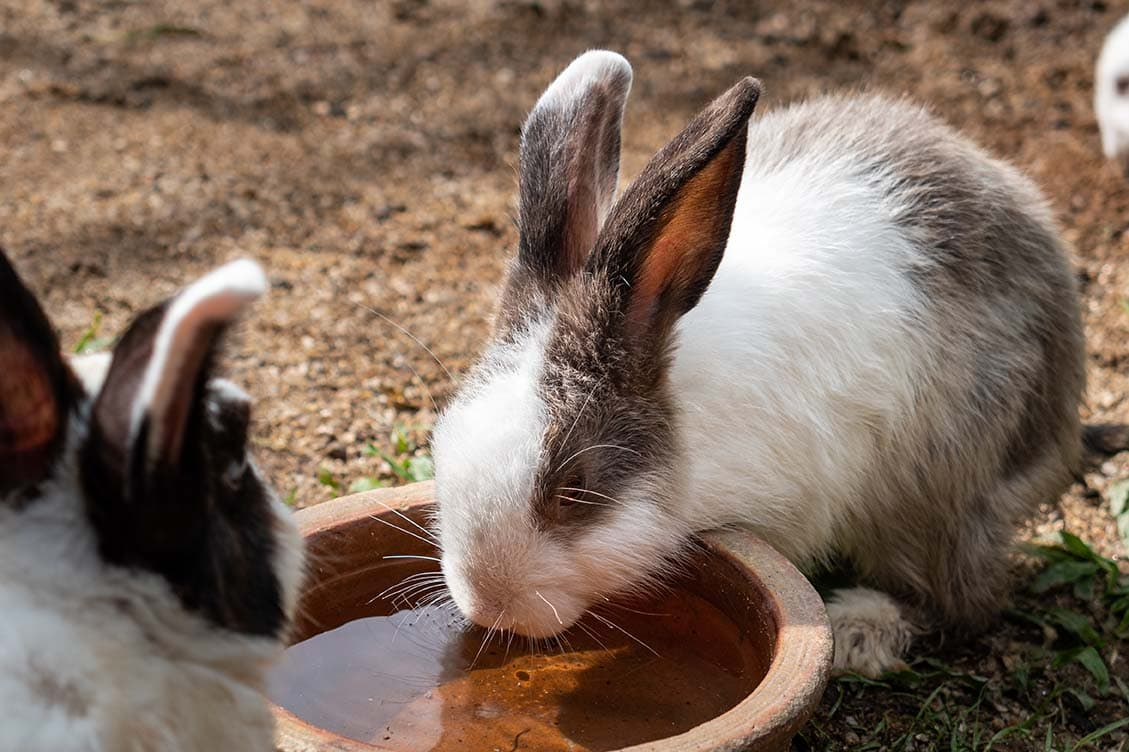Info Guides, Rabbits
Is it Cruel to Keep Rabbits in a Hutch?
All domestic rabbits, whether they are being kept as companion animals or meat rabbits, need to be housed in an enclosure.
Even a house rabbit, that will live indoors and be free roaming throughout your house, still needs a hutch to hop back to at night time.
Rabbit owners may worry it is cruel keeping a rabbit inside a hutch.
But that isn’t true, as long as the hutch is safe, comfortable and meets the welfare needs of your rabbit.
Is it Abuse to Keep a Pet Rabbit in a Cage?
Generally speaking – No, keeping a rabbit in a cage is not cruel. But it depends on the cage.
In fact, it is usually the opposite. It is cruel to leave our pet rabbit outdoors in an open space, unsupervised and at risk of being injured or attacked by predators.
As a rabbit owner, it is your responsibility to protect your pets by providing them with a secure home.
But it is also your responsibility to make sure the cage is the appropriate size and has the right features.
Benefits of a Rabbit Hutch
Some people will argue that keeping a pet rabbit in a confined space is unnatural.
But remember that domestic rabbits are not the same as wild rabbits.
Wild rabbits will live in a burrow they have dug into the Earth but a domestic rabbit won’t know how to do this.
They have been bred as pets and will lack these sort of instincts.
It is therefore your responsibility to provide a house for your pet rabbit that is comfortable.
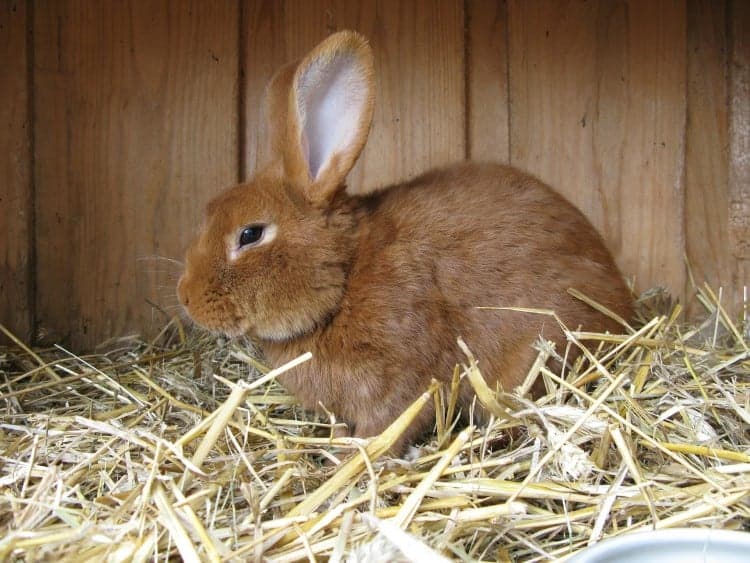
Keeping Rabbits in Hutches
A hutch is a perfect way to help your rabbit feel at home.
One benefit of a hutch is to keep your rabbits inside, contained safely.
This will stop your rabbit running away and getting lost or hurt.
Another huge benefit of a hutch is to protect your rabbit by keeping other animals and predators out.
Rabbits are naturally prey animals and vulnerable to many suburban predators including cats, dogs and foxes.
The hutch should be made from sturdy, long lasting wood. It will need strong wire mesh on the sides.
You can also use a hutch to keep male and female rabbits apart. This can prevent unwanted litters.
How Long Can a Pet Rabbit Stay in a Cage?
You should aim to let your rabbit outside of its hutch for at least one hour every day to run around.
The more often you let your rabbit out, the happier it will be and the less health problems it will experience.
You can set up a rabbit exercise space either outdoors on the grass or inside your home.
Using a puppy play pen, such as the Somerzby Arena, can create a safe place for your rabbit to run without being able to wander too far.
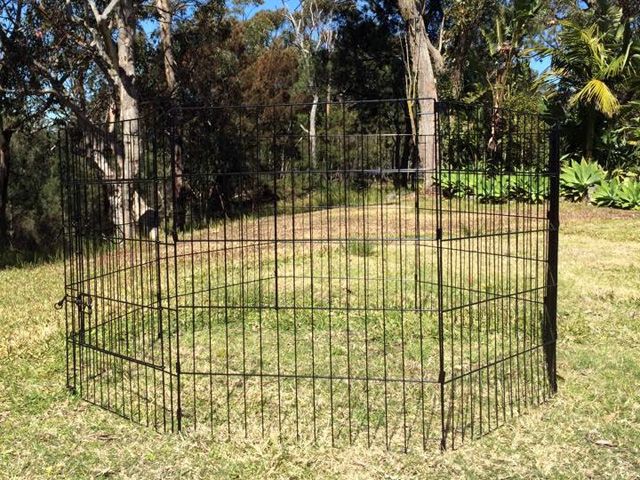
Somerzby Arena
Small enclosures like these keeps your rabbits safe in an enclosure while giving your furry friends enough space to roam and play.
If you are setting this area up outside, you will need to supervise your bunny to make sure no predators (such as stray cats or dogs) are able to jump into the play pen and injure your rabbit.
If you are setting the rabbit play area up indoors, your main concern will be making this area rabbit proof and blocking your rabbits access to cables or furniture you don’t want chewed on.
It is a good idea to get into the habit of letting your rabbit out of its hutch to free range at the same time everyday, so you don’t forget to do it.
For example, every night after dinner when you watch TV with your family, bring your bunny inside for a hop around in its playpen in the living room.
If you have multiple rabbit companions, they can stay in the hutch longer because they will keep each other company.
However, if you only have one rabbit, you should let it outside of its hutch more often.
If you leave them locked inside their hutch 24/7, most rabbits will become stressed out or depressed.
The lack of exercise can also lead to obesity and other related health problems.
It is recommended you place outdoor hutches in an area close to your house where you will naturally walk past often.
This means you are more likely to interact with and talk to your rabbit.
If the hutch is far away in the back corner of the yard, you may forget your bunny sometimes and visit it less often, which is not fair on these social animals.
How Much Space do Pet Rabbits Need?
You will need to provide your pet rabbits with a large hutch that has enough space to fit a drink bottle and food bowl.
If your rabbit is litter trained, you will also need to allow room for a litter tray.
It is ideal the hutch is tall enough for your rabbit to perform natural behaviours such as standing on its back legs and stretching upwards without its ears touching the roof.
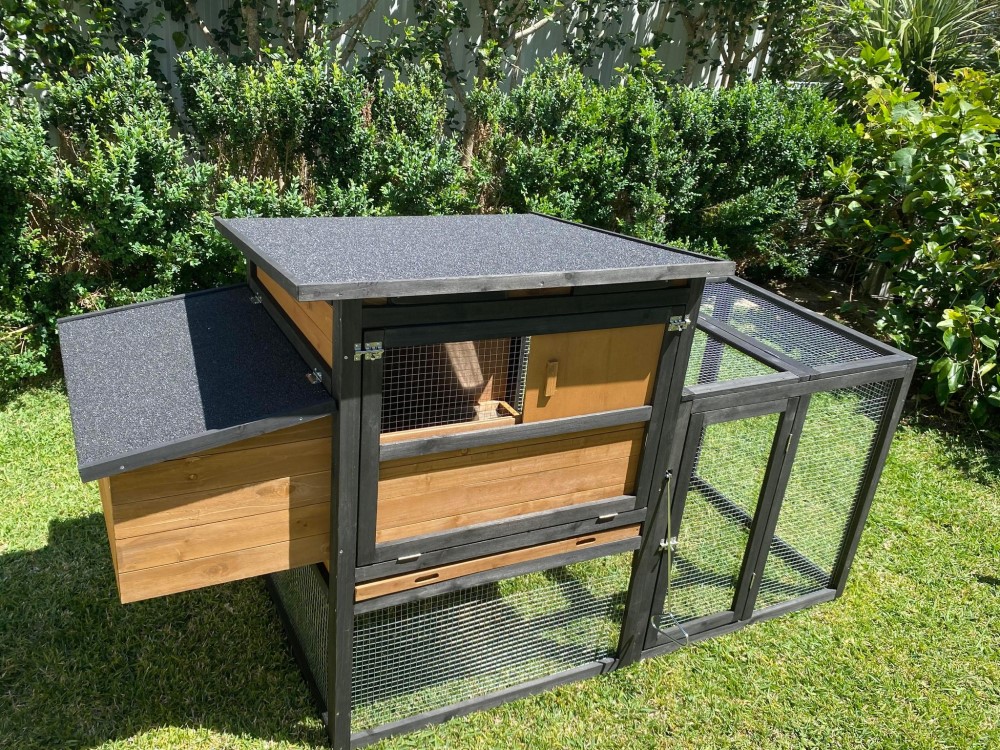
How Much Room Is Required For Rabbits?
The hutch should allow your rabbit enough space to stretch out and hop around.
The more room you are able to give your rabbit, the happier it will be.
Go as large as you are able to fit into your space and as large as you can afford.
If you have two rabbits or more, allow extra room.
If you will let your rabbit out of its hutch for long periods each day, you can get a slightly smaller hutch.
But if your rabbit will be inside the hutch for around 23 hours each day, you will need something with a longer run and more space to hop around in.
What Features Does the Rabbit Hutch Need?
Hutches come in a wide variety of shapes and sizes.
But all rabbit hutches, whether you have outdoor or indoor rabbits, need to have the following important features:
Safety
A hutch must be safe. It needs to keep your rabbit in.
It also needs to effectively keep other rabbits, dogs, cats, other animals and predators out.
Make sure predators cannot dig their way in underneath.
You can do this by building the hutch onto a solid base or by adding wire mesh onto the floor area yourself.
If you are keeping your rabbit outdoors, outdoor hutches need to be covered in fly screen to stop insects.
The fly screen keeps out mosquitos which can spread potentially fatal diseases such as myxomatosis and calicivirus.
It will also prevent fly strike, which is when flies lay eggs on your rabbit and then the maggots hatch. This can also be deadly for your rabbit.
Space
Responsible rabbit owners should choose a larger enclosure that provides the rabbits enough space to hop around and live without being restricted.
A rabbit’s environment should give it enough room to stretch out without hitting into the side walls.
Your rabbit’s hutch should include both a ‘house’ area to hide away and a ‘run’ area to play and hop around.
Food and Water
An important part of rabbit ownership is providing your rabbits with the supplies they need.
Buy a water bottle designed specifically for rabbits or guinea pigs. These are available in most pet stores.
Your rabbit should have a constant supply of grass hay. Also provide your bunny with small quantities of nutritionally balanced pellets.
You can give your rabbit vegetables as a treat – leafy greens and root vegetables are the best options.
Litter
If your house rabbit is litter trained, also include a litter tray.
Toys
Rabbit care is not only about food and safety, but also about keeping your bunnies happy.
Include toys inside their hutch to keep them entertained.
Many rabbits enjoy wooden chew toys as well as if you hide their food for them to sniff out and find.
As a prey animal, hiding is a normal behaviour for rabbits and helps them to feel safe.
Provide them with hiding places such as tunnels made from old cardboard boxes or plastic igloos from pet stores.
Heat
Rabbits, particular those of a young age, are prone to heat stress.
This is because they have a thick fur coat and limited ways to expel heat from their body.
Ensure your rabbits environment has shady areas.
During warm weather, you can put a frozen water bottle into the hutch to cool the area down or alternatively bring your rabbits inside until the weather cools down.
References
https://homeandroost.co.uk/blog/are-rabbit-hutches-cruel/
References
https://homeandroost.co.uk/blog/are-rabbit-hutches-cruel/




